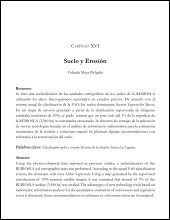TOLERANCIA A LA SALINIDAD EN VARIEDADES DE ALBAHACA (Ocimum basilicum L.) EN LAS ETAPAS DE GERMINACIÓN, EMERGENCIA Y CRECIMIENTO INICIAL
Salinity tolerance in varieties of basil (Ocimum basilicum L.) during the stages of germination, emergence and early growth
Author
JUAN JOSE REYES PEREZ
BERNARDO MURILLO AMADOR
ALEJANDRA NIETO GARIBAY
ENRIQUE TROYO DIEGUEZ
EDGAR OMAR RUEDA PUENTE
JOSE LUIS GARCIA HERNANDEZ
Metadata
Show full item recordAbstract
" Conocer los índices de tolerancia de los cultivos a la salinidad es importante para recomendar a los agricultores la variedad más productiva para cultivarse en suelos salinos, ya que los suelos afectados por la sal en todo el mundo son cada vez más comunes. En el presente trabajo se evaluó la tolerancia a la salinidad de veinte variedades de albahaca en las etapas de germinación, emergencia y crecimiento inicial, utilizando variables morfométricas. Se utilizaron dos tratamientos salinos (50 y 100 mM de NaCl) y un control. En las etapas de germinación y emergencia se calcularon índices de tolerancia para longitud de radícula, biomasa fresca y seca de radícula y biomasa fresca y seca de parte aérea, mientras que en la etapa de crecimiento inicial se calcularon índices de tolerancia para longitud de tallo, longitud de raíz, biomasa fresca y seca de raíz, tallo, hoja y área foliar. A través del análisis de conglomerado jerárquico y de ligamiento completo sobre la base de la distancia Euclidiana, las variedades se reunieron en cinco grupos según los índices de tolerancia medidos en la etapa de germinación, en tres grupos en la etapa de emergencia y en dos grupos en la etapa de crecimiento inicial, indicando diversidad genética intravarietal en las variedades evaluadas, destacándose, entre las variedades analizadas. En las tres etapas fenológicas estudiadas, la variedad Napoletano como la más tolerante y Sweet Genovese como la más sensible a la salinidad. " " Knowing the salinity tolerance of crops is important in making recommendations to farmers on the most productive cultivar to grow in saline soils, considering that soils aected by salt are more and more common worldwide. This study evaluated the salinity tolerance of twenty varieties of basil during the stages of germination, emergence and early growth, considering morphometric variables. Two saline treatments were applied (50 and 100 mM NaCl), together with a control. During the stages of germination and emergence, tolerance indices were calculated for radicle length, fresh and dry radicle biomass, and fresh and dry shoot biomass, whereas during the initial growth stage, tolerance indices were calculated for stem length, root length, biomass of fresh and dry root, stem and leaf, and leaf area. A hierarchical cluster analysis with complete linkage based on Euclidean distances formed ve groups of plant varieties according to the tolerance indices recorded during the germination stage, three groups during the emergence stage and two groups during the initial growth stage, indicating intra-variety genetic diversity in the studied varieties. Of the varieties analysed during the three phenological stages, the Napoletano variety was the most tolerant and the Sweet Genovese the most sensitive, to salinity. "
Collections
Related items
Showing items related by title, author, creator and subject.
-
PROMOCIÓN DEL PERIFITON PARA EL CULTIVO DE CAMARÓN BLANCO: HACIA UNA ACUICULTURA ECOLÓGICA
DOMENICO VOLTOLINA LOBINA; JUAN MANUEL AUDELO NARANJO; MARIA DEL ROSARIO PACHECO MARGES -
Suelo y Erosión
YOLANDA LOURDES MAYA DELGADO


